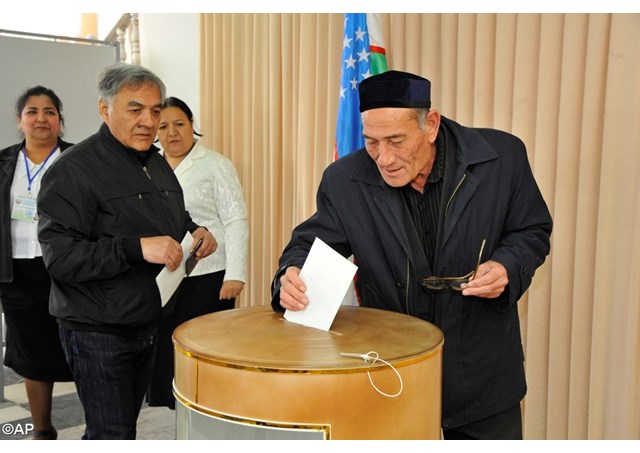
Uzbekistan President Victory Expected Despite Political Uncertainty

(Vatican Radio) Uzbekistan's election commission says more than 91 percent of eligible voters cast their ballots in Sunday's controversial presidential election. While the long-time autocratic leader Islam Karimov was expected to be re-elected, concerns have emerged about the political future of the former Soviet republic.
Listen to our report by correspondent Stefan Bos:
In theory, the 77-year-old President Karimov faced three rivals for Uzbekistan's top job, but in practise his victory seemed a foregone conclusion. Analysts said not only were his rivals platforms free of innovatory ideas or reformist pledges, their speeches routinely began by singing the praises of incumbent Karimov, who has led the former Soviet republic in Central Asia since the late 1980s.
He also ruthlessly quashed all opposition to his rule. Yet the future of the country of 30 million people is coloured by uncertainty. Analysts say
there is lack of a clear succession plan should Karimov suddenly leave the scene. His powerful elder daughter Gulnara Karimova was once being groomed for presidential post. But it fell apart last year when her business empire was dismantled.
Karimova, whose activities as a pop star and fashion designer were often in Uzbek media, was put under house arrest after a very
public row with her mother and sister and reports of financial wrongdoing. Commentators interpreted the scandal as a sign of political rivalries and an indication that President Karimov may be losing his grip on power.
INCREASINGLY ISOLATED
Analysts say he has found himself increasingly isolated, not always fully informed and with no obvious successor in place. Additionally, economic difficulties in Russia, where around 3 million Uzbeks live and work, is expected to impact the country.
Since gaining independence in 1991, Uzbekistan has pursued a policy of economic self-reliance and sought to balance its diplomatic relations with the West and Russia. However Karimov has made it a point to call Russia an important ally despite Western criticism over its role in Ukraine.
"Russia is our strategic partner, and I realise there are those for whom this expression is just empty words to be used on formal occasions," he said during a recent meeting with Russian president Vladimir Putin. And Karimov added that "we should seek each other's advice more often and try to get answers to our questions so as not to find ourselves at a loss."
However he also faces a troubled security situation in neighbouring Afghanistan, and needs both Russian and Western help. The United States installed a military base in the country after the Sept. 11, 2001, terrorist attacks. But it was forced to abandon that facility in 2005 as relations between the countries soured following a violent government crackdown on rioters in the Ferghana Valley city of Andijan that is believed to have left hundreds dead.
Rights activists and reporters note that almost all Western media have been barred from reporting inside the country since that time. Independent journalists and activists face sustained harassment, and reported torture and imprisonment. Sunday's reported huge voter turnout of voters was not expected to change their plight.
| All the contents on this site are copyrighted ©. |


